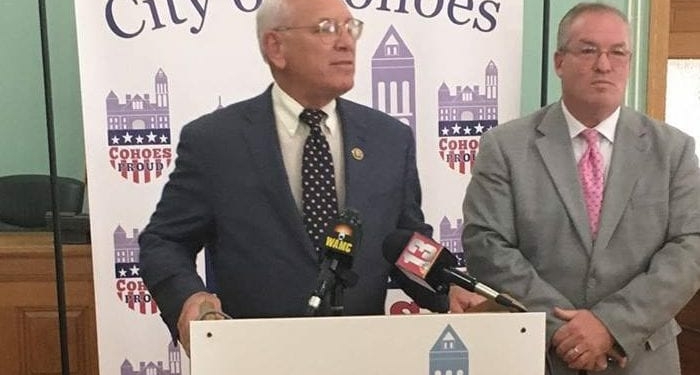COHOES — The Capital District could see a jump in federal funding for the remediation of contaminated sites thanks to a bill that would increase the amounts allocated to municipalities.
At a press conference on Aug. 16, U.S. Representative Paul Tonko, the bill’s sponsor, along with Cohoes Mayor Shawn Morse, outlined the Brownfields Authorization Increase Act of 2016, which calls for an increase in federal funding for brownfield remediation.
The bill calls for an incremental increase in annual funding for the program managed by the Environmental Protection Agency to a $600 million cap in 2022. Currently, $200 million is set aside for grants for remediation that municipalities may apply for.
For individual state remediation efforts, the amount would be boosted to $120 million annually by 2022. Right now, the state amount is capped at $50 million.
Tonko said that the new bill would streamline the funding application process, and make the process much more flexible.
He also said that the bill, if passed, would “clearly identify a large commitment” from the federal government to smaller governments. He added that Washington needs to be more aggressive in partnering with local municipalities, and that it is unrealistic to put the burden of cleaning these sites on taxpayers.
Cohoes, an former mill town, has at least 400 acres of brownfields which require remediation along the waterfront and Route 787. While the city’s government has been putting together plans to clean such areas for the last decade, the funds have not been there to put the plans into action, said Morse.
“We have the one piece that starts our reinventing of our community. We need the second piece, that will give us the capital to start cleaning up some of these Brownfield sites,” Morse said.
Morse said that Cohoes does not represent a good deal for developers as it stands now, and pointed out that the city, which is under tremendous pressure to stay under the two percent property tax cap, can only survive if the tax base is broadened.
Tonko insisted that Cohoes residents will see a direct economic impact with the possible funding increase, projecting that for every dollar invested in the cleanup, the city will get back $17 or $18 into private or public sources. Properties near the newly cleaned up sites would see their value jump anywhere from five to 11 percent, according to Tonko.
“That’s a tremendous economic boom that we need to be cognizant of,” he said. Morse said that if the money is there, Cohoes will grow rapidly, but if not, the city could be plunged into dire financial straits.
“If they abandon us, we will be what we are today,” Morse said of the federal government. “A struggling mill town with nowhere to turn.”



